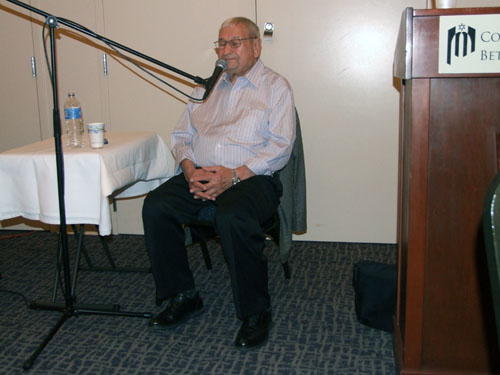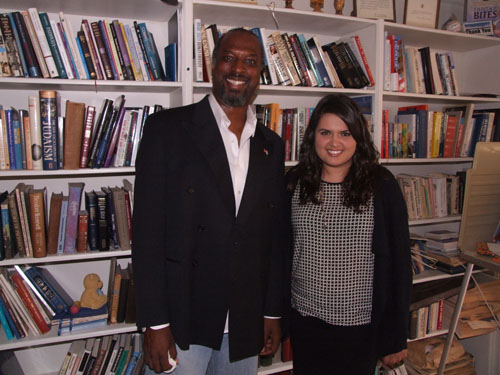
By Donald H. Harrison

SAN DIEGO –Holocaust Survivor Lou Dunst and Christian Zionist preacher Rev. Dumisani Washington of Stockton, Calif., are four decades apart in age, yet hearing one and then the other speak, gave me reassurance that Washington’s message partially fulfills the intent of Dunst’s agonized rhetorical cry of pain: “And the Free World did nothing!”
Dunst, 88, at a meeting Wednesday evening, Oct. 23, of the Men’s Club of Congregation Beth Israel, told of his life in Czechoslovakia prior to its takeover by the Nazis, and then chronicled how Jews were isolated; humiliated; tortured; packed onto cattle cars; and sent to Auschwitz, where they either were gassed and cremated, or worked to death as laborers, falling victim to disease, brutality and to starvation. Dunst was sent from Auschwitz to Mauthausen, where he was reduced to a walking skeleton prior to his liberation by the U.S. Army. Except for the final part of his story, when he was liberated, each step of his journey, in his telling of it, went from bad to worse, “always worse,” and, about each phase of Hitler’s intended total genocide of the Jews, he stated rhetorically: “And the Free World did nothing!”
Although most of the members of the Men’s Club were familiar with how the Holocaust unfolded—either through reading history, or via bitter family experience—they remained hushed through Dunst’s presentation, awed by the gravity of his subject matter and the agony that he had survived. There was another element as well: The generation of Holocaust survivors is speedily dying off; Dunst, who now must sit, rather than stand, during his presentations, is a member of an ever-shrinking group of people still alive who were witness to this awful history. I was accompanied to his speech by my grandson, Shor, 13, and I was thankful that, however grim was Dunst’s story, Shor had the opportunity to hear it first-hand, and then to shake Dunst’s hand. It will not be so long when the history of the Holocaust, which unfolded between Hitler’s rise to power in 1933 and Nazi Germany’s surrender in 1945, will be accessible only in history books or on DVD’s.
Dumisani Washington, who adopted a Zulu first name meaning “Praise,” was the child of parents who, while not activists, closely followed the African-American struggle in the United States for Civil Rights, and were impressed and motivated by the Rev. Dr. Martin Luther King Jr. In Little Rock, Arkansas, they had been members of the King Solomon Baptist Church, the very name of their congregation suggesting the sense of respect and identification that African-Americans have for the Jewish people of the Bible.
Growing up in Stockton, Washington started playing piano for the church choir when he was 10, and later, as a performing keyboardist and graduate of the San Francisco Conservatory of Music, began collecting music of the Jewish people whose Tanakh had always fascinated him. He learned more and more about Jews, watched the airlift of Ethiopian Jews to Israel, and became incensed as the small, multi-ethnic country was compared cynically to South Africa with its apartheid system. A dear friend from South Africa, who had influenced him to take the Zulu first name, recounted to him what real apartheid was like and said ascribing the evil system to Israel was a travesty.
Washington became the pastor of Congregation of Zion in Stockton; the founder in 2013 of the Institute for Black Solidarity With Israel; and, as of September, the outreach coordinator for Christians United For Israel (CUFI).

Accompanied by Sarah Gipoor, West Coast Coordinator of the Israel advocacy group, StandWithUs’s teens high school program, Dumisani was in San Diego to speak at San Diego State University, San Diego Jewish Academy, and Rancho Buenavista High School. I had the opportunity to interview him on Tuesday, October 22.
In bringing the message of solidarity with Israel to the African-American community—and in particular to fellow pastors of Black churches—he told me that he initially stresses the support Dr. King found in the Jewish community, particularly from people like Rabbi Abraham Joshua Heschel of the Jewish Theological Seminary. He noted that King addressed an audience of rabbis just 10 days before his assassination, and just the night before he was murdered in Memphis, he gave his “I’ve been to the mountaintop” speech, drawing on the biblical story of Moses atop Mount Nebo, to assure his listeners that although he might not get there with them, he had “seen the Promised Land” of freedom. He also paraphrased King as telling his aides that “no one knows our struggle like the Jewish people; no one has been in our struggle like the Jewish people.”
When the conversation turns to Israel, Washington said, he emphasizes three points.
First, that Israel is a multi-ethnic country. While his fellow African-Americans may be most familiar with Jews of European origin (The Ashkenazim), other Jews have migrated to Israel from North Africa and the Middle East, from Ethiopia, India, and China.
Second, Israel has been a good friend of sub-Saharan African states since Ghana gained its independence in 1957. It has shared its technology and has provided educational opportunities to the students of various African countries, among them Kenya, Tanzania, Uganda, and Nigeria.
Third, Jews and Israel have the concept of “tikkun olam” which is similar to Dr. King’s concept of social justice, which he said should “flow like a mighty stream.”
Moving to the international political situation, Washington says Palestinians and their supporters have been adept at framing a false narrative that demonizes Israel, but which falls apart when the subject of human rights is seriously addressed.
In the most recent war between Hamas and Israel, said Washington, “Hamas did not only use civilians as shields, it would literally fire missiles at its own people in Gaza, and then have CNN come in and film the carnage and say the IDF did this, and it was so effective for people who don’t have enough information.”
He said when people raise the question whether Palestinians are suffering, he responds: “We are very concerned about what is going on in the Palestinian Authority and in Gaza. Let’s talk about the Palestinian Authority; let’s talk about how Abu Mazen (nom de guerre for Mahmoud Abbas) makes $1 million per month, that is obscene! Let’s talk about how in Gaza there are 1,700 millionaires within Hamas-some have even become billionaires–and yet poverty still persists, and what Dr. King would say about that and about social justice.”
Washington said he also tells his audiences that if Israel is so bad, why is it that thousands of Palestinians would like to become Israeli citizens? “For us, as a Black church,” he adds, “when we are able to show that being an Israel advocate makes you stand on the right side of human rights and social justice, then it resonates even more, and that is what we have found is most effective.”
Sometimes at college forums, he said, he is challenged by those who have bought into by the pro-Palestinian rhetoric. For them, he said, he has this message: “If you are really concerned about human rights, explain why you have said nothing about the fact that honor killings in the Palestinian Authority have been up 200 percent since last year. Abu Mazen is making all this noise about being a state, and human rights abuses have gone up, not down.
“If you care about it, say something about the poverty, or something about these guys flying to Qatar and all over while these people are in poverty. Say something about BDS (the boycott, divestment and sanctions movement) trying to shut down a SodaStream plant that is employing 900 employees, and the Palestinians working there saying ‘shut your mouth, we want to work here!’”
To students active in anti-Israel causes, Washington lectures: “This is not human rights work, you are not doing the hard work of Dr. King by doing the research; you are just jumping on the band wagon.” That band wagon, he added, is nothing less than an attempt to destroy the only Jewish state in the world.
Washington said he is passionate about Israel’s cause, and is proud to follow in the path set down by Rev. Dr. Martin Luther King Jr.
Perhaps, as Lou Dunst said, “the Free World did nothing” during the night of the Holocaust, but Washington helps us understand where The Free World should stand during the daylight of Israel’s existence.
*
Harrison is editor of San Diego Jewish World. He may be contacted via donald.harrison@sdjewishworld.com
Thank you for Rev. Dumisani Washington for providing this information about the 1700 millionaires within Hamas while there is such poverty in Gaza as well as the fact that Mahmoud Abbas (Abu Mazen) makes $1 million per month. The pictures added to this timely and important article.
Pingback: Israel’s Earthly Help May Come from a Most Unlikely Place – the Black Church | BCNN1 WP
Pingback: StandWithUs choice of venues prompts controversy - San Diego Jewish World